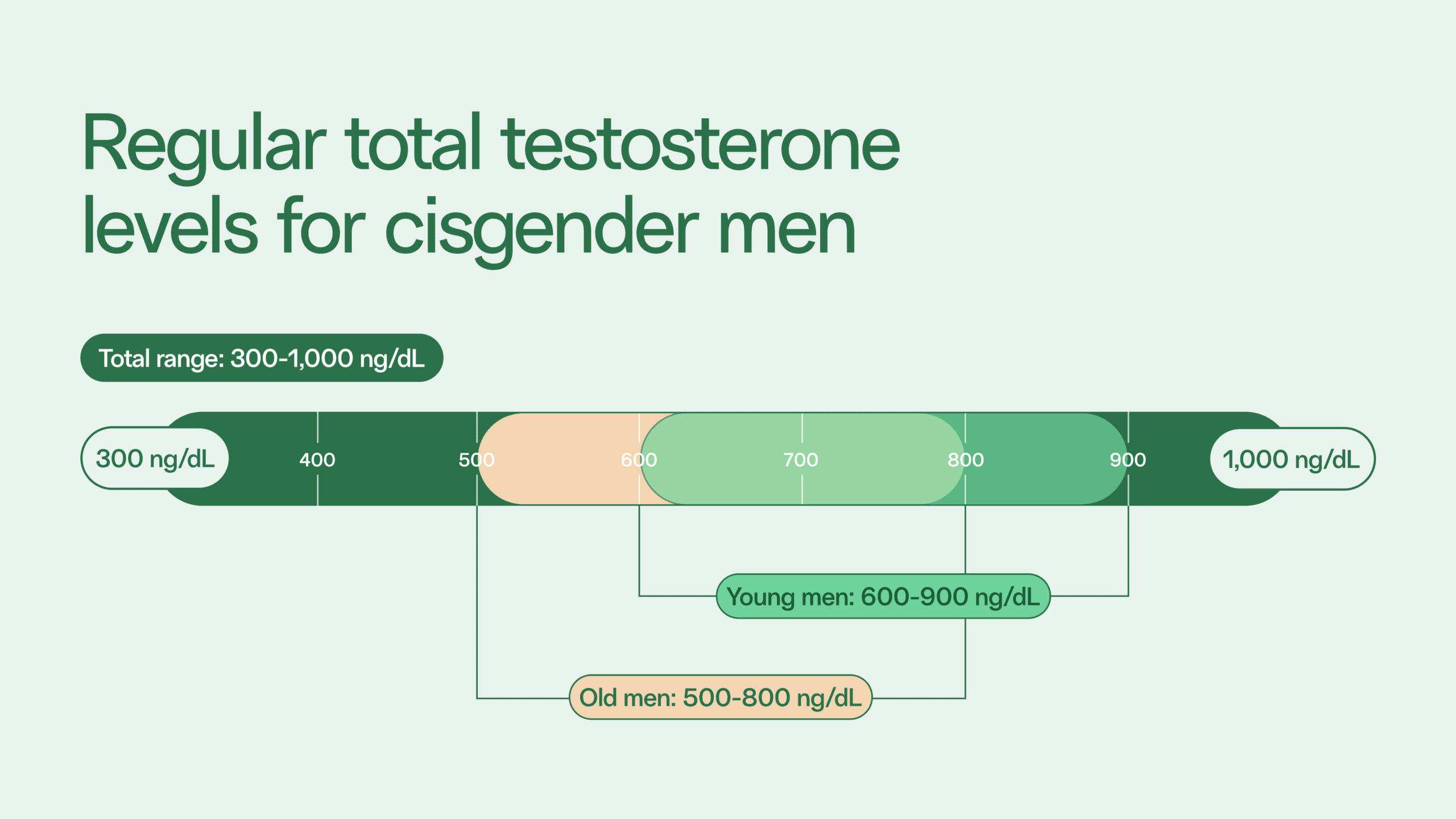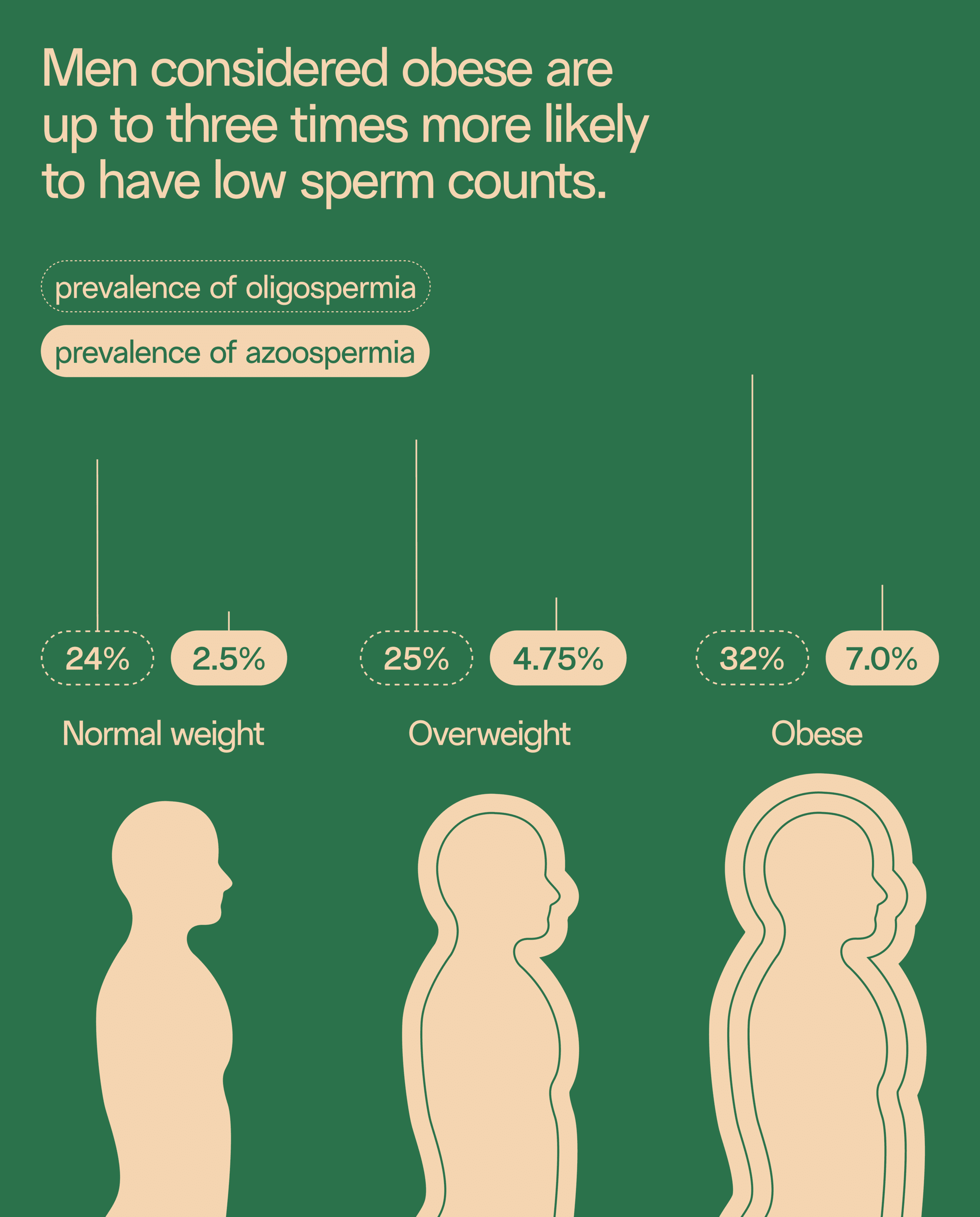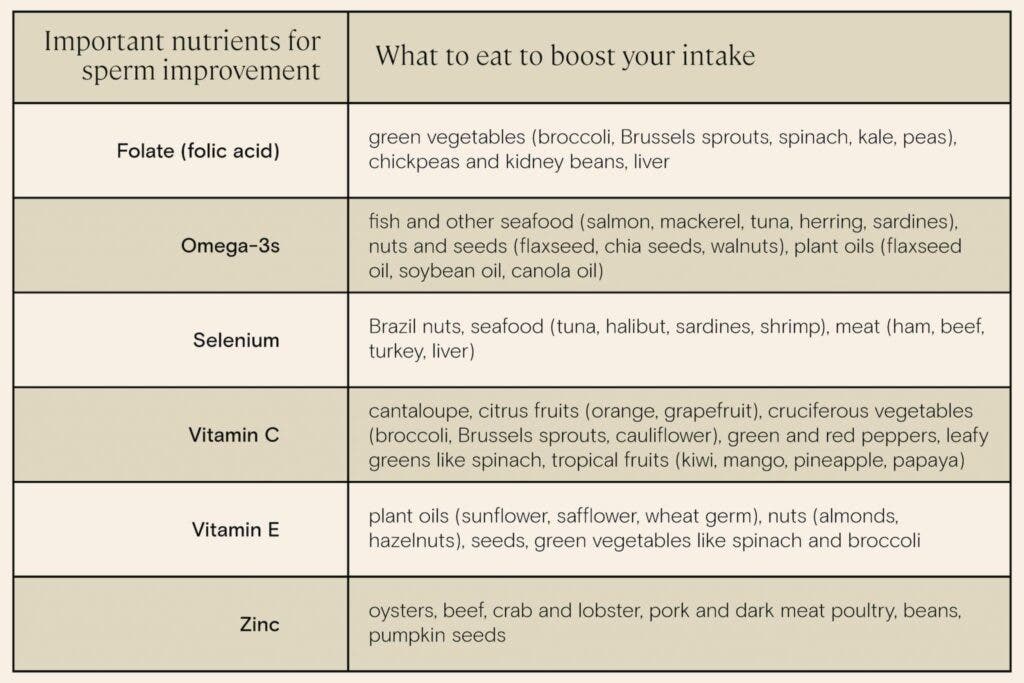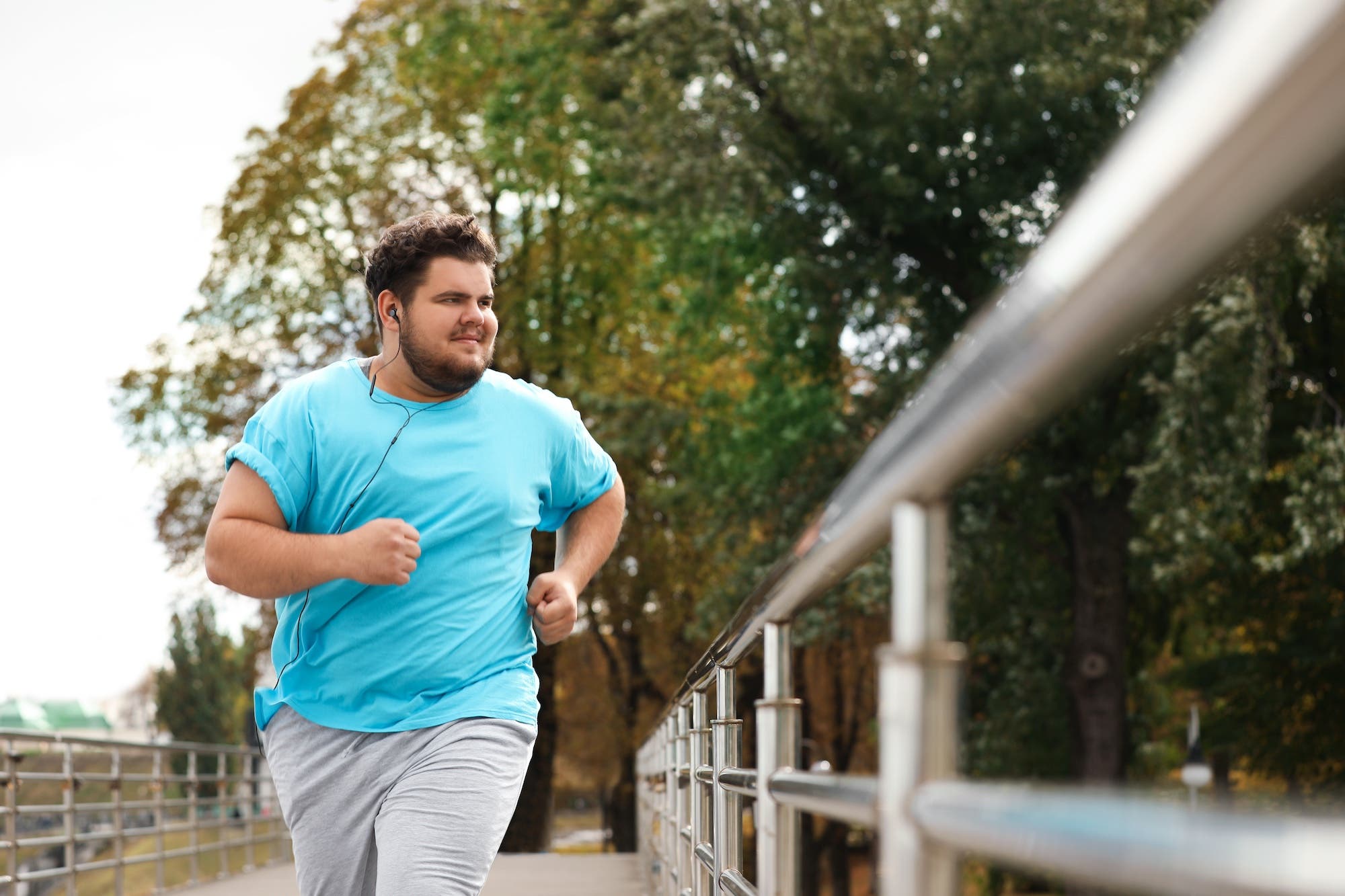If you’ve been diagnosed with low testosterone or have symptoms of low testosterone, you may be wondering: how can you increase your testosterone? Can lifestyle changes improve your T levels? Is testosterone replacement therapy (TRT) your only option, or can you increase your testosterone naturally? Let’s dive in.
Key takeaways
- TRT is a common treatment for low testosterone, but it has potential side effects. Many men with low T are looking for natural methods to improve their hormone health.
- Lifestyle changes like weight loss, sleep, certain supplements, and exercise may help maintain or boost your testosterone levels.
- Natural methods won’t work for all cases or causes of low T, but they may still be beneficial for your health and your fertility.
Low testosterone treatment
You may be diagnosed with low testosterone, also known as low T or hypogonadism, if your blood testosterone levels are below 300 ng/dL after multiple tests. The diagnosis of low testosterone is typically brought on by bothersome symptoms, such as erectile dysfunction, depression, or decreased muscle mass.
Low testosterone is relatively common, affecting around 39% of men aged 45 or older.1 It may be caused by medical conditions, medications, lifestyle, or age, as testosterone levels naturally decline around 1% each year after you turn 30.2

A common treatment for hypogonadism is testosterone replacement therapy (TRT). TRT involves taking lab-produced testosterone as an injection, patch, tablet, or gel to increase your blood testosterone levels.
However, TRT has potential side effects including infertility after testosterone treatment, liver damage, and blood clots. More studies are needed on the long-term safety of TRT. Plus, the FDA has also only approved TRT for low testosterone caused by medical conditions, cautioning that the benefits have yet to be shown for low T associated with aging.3
For those reasons, many men are looking for alternatives to testosterone replacement therapy.
Natural ways to boost testosterone
If you’re looking to increase your testosterone levels naturally, without TRT, there are other options you can try.
Note that these lifestyle methods may not work for all people with low testosterone. If your low T is caused by genetic disorders, testicular failure, or cancer, for example, lifestyle changes may not make a difference. But even if these tactics don’t improve your testosterone, they’ll likely still benefit your health. Let’s explore evidence-based ways to increase your testosterone levels.
Get to a healthy weight
Many studies have linked obesity and being overweight (specifically BMI, waist circumference, and percentage of body fat) to lower testosterone levels in men. In fact, some research states that obesity is the biggest predictor of low testosterone levels, and also contributes to age-related declines in testosterone.4
It’s unclear exactly why obesity may lead to lower testosterone levels, and it’s a “chicken or the egg” scenario — as weight gain and inability to build muscle can also be symptoms of low testosterone. But some research indicates that losing weight may help increase testosterone levels.5

One longitudinal study of 2,736 men in Europe found that weight gain was associated with a decrease in testosterone, while weight loss was associated with an increase.6
Another study looked at the impact of moderate-intensity exercise in 90 obese men over 24 weeks, finding that a high volume of exercise resulted in more significant improvements in weight reduction, testosterone levels, and sexual function.7
Learn more about body weight and male fertility.
Exercise
You may be able to increase your testosterone levels with exercise, but it likely depends on the type and intensity of the workout.
One study found that while resistance training had little effect on testosterone in men aged 60 or older, aerobic training and interval training may be linked to small increases in testosterone levels.8 Another study found that high-intensity interval training (HIIT) also increased testosterone levels in sedentary older men.9
Obviously, exercise can result in weight loss, which as just discussed is associated with testosterone improvements. But exercise itself may have benefits besides just reducing weight.
One study compared the effects of aerobic exercise versus calorie restriction in obese men and found that testosterone levels were significantly higher in the group that did more physical activity.10
Eat a balanced diet
More research is needed on diet and testosterone, but the two appear to be linked.
Many men believe that a carnivore diet can increase testosterone. However, a recent study found that men who ate a diet high in saturated fats had lower testosterone levels and an increased risk of testosterone deficiency.11 The same can be said for refined carbohydrates, like white flour and sugar.
Diets emphasizing fats and protein, like the ketogenic diet, may help increase testosterone. In one study of young men engaging in an 11-week resistance training program, those who ate a ketogenic diet showed a significant increase in testosterone levels compared to those following a Western diet.12
As research is ongoing into the long-term health benefits of specific diets, as well as their effects on testosterone, it may be best to eat a balanced diet that supports your overall health and fertility.
See 6 superfoods for male fertility.
Increase intake of vitamin D, zinc, selenium, and d-aspartic acid
Within your diet, certain nutrients and supplements may give your testosterone levels a boost. Here are a few examples of supplements to increase testosterone and improve overall health.
Vitamin D to boost testosterone
One study found that, among overweight men in a weight reduction program, the group that took vitamin D supplements for one year had significant increases in testosterone levels compared to the group that didn’t.13
Nearly half of Americans are deficient in vitamin D. Besides supplements, you can get vitamin D from sunlight or by eating foods like fatty fish and mushrooms.
Zinc to boost testosterone
Some research has shown that increasing zinc intake resulted in increased testosterone, while reducing zinc resulted in decreased testosterone levels.14
You can get zinc from red meat, nuts, whole grains, and beans. If you get sufficient zinc from food, you don’t need to take a supplement.

Selenium to boost testosterone
One 3-month study found that taking 50 micrograms of selenium each night was linked to increased testosterone and improved sperm parameters in infertile men.15
Selenium can be taken as a supplement or found in brazil nuts, seafood, dairy, and other foods.
D-aspartic acid to boost testosterone
Studies are mixed on the effects of the amino acid D-aspartic acid on testosterone. One study indicated that taking D-AA for 12 days increased the release of luteinizing hormone — which tells the testicles to make testosterone — and testosterone.16
You can find D-aspartic acid in foods like beef, eggs, and avocados, but more research is needed on its effects on testosterone.
Reduce alcohol intake
Research has linked alcohol to low testosterone levels.17 This may be because alcohol affects the function of Leydig cells, which are located in the testes and produce testosterone.
One study observed decreased testosterone levels in a small group of male participants 30 minutes after they drank a mixture of whiskey and water, though the effect was not maintained after that point.18
Another study of alcohol-dependent men found that, over 40 days after stopping use of alcohol and tobacco, testosterone levels among participants significantly increased.19 The authors noted that even among people who drink frequently, testosterone levels could improve significantly as long as the liver is functioning.
With alcohol consumption impacting testosterone levels, cutting back on alcohol may help increase testosterone naturally. As a bonus, reducing your alcohol intake may also improve your libido, preventing “whiskey dick,” and can improve sperm health, as alcohol intake may affect male fertility.
Avoid tobacco
Similarly to alcohol, many studies have suggested a link between tobacco use and testosterone levels. This is potentially caused by Leydig cell dysfunction or oxidative stress resulting from smoking.
A study from 2021 found that testosterone levels were significantly lower among smokers than people who didn’t smoke.20 Some conflicting research has suggested that smoking may be associated with increased testosterone levels, but the reasons behind this are unclear.21
Considering smoking’s range of negative effects on health and fertility (including damaging sperm DNA and increasing the chance of erectile dysfunction), it’s best for both your overall and reproductive health to avoid smoking.
Prioritize sleep
Getting enough sleep is important to maintain and boost your testosterone levels. Fragmented sleep, short sleep duration, and obstructive sleep apnea all appear to be linked to lower testosterone.
Testosterone levels in the blood peak during sleep, as long as you get at least 3 hours of uninterrupted sleep.15 Still, you likely need a full night of sleep — ideally, around 7–9 hours each night — to optimize your testosterone levels, especially as you get older.22
A small study of 10 young, healthy men found that one week of restricting sleep to 5 hours per night led to decreases of 10 to 15% in daytime testosterone levels.23 Similarly, a study of U.S. Army Rangers found that testosterone was 25–30% lower after an overnight training mission.24
Besides helping maintain and potentially boost testosterone, sleep improves your immune function and cognition and provides other health benefits. Furthermore, it appears that trying to catch up on lost sleep may not fully reverse the effects of insufficient sleep. Where possible, do your best to get enough sleep for your health and fertility.
Considering testosterone replacement therapy? Learn more about why you should freeze your sperm before TRT, or watch the full webinar below for everything you need to know.
References
1. Dandona et al, “A practical guide to male hypogonadism in the primary care setting.” 2010.
2. Bassil et al, “The benefits and risks of testosterone replacement therapy: a review.” 2009.
4. Fui et al, “Lowered testosterone in male obesity: mechanisms, morbidity and management.” 2014.
5. Singh et al, “Is it Time to Test the Effect of Weight Loss on Testosterone?” 2019.
9. Hayes et al, “Exercise training improves free testosterone in lifelong sedentary aging men.” 2017.
13. Pilz et al, “Effect of vitamin D supplementation on testosterone levels in men.” 2010.
14. Prasad et al, “Zinc status and serum testosterone levels of healthy adults.” 1996.
15. Morbat et al, “Effect of Selenium in Treatment of Male Infertility.” 2018.
17. Duca et al, “Substance Abuse and Male Hypogonadism.” 2019.
20. Salam et al, “Effect of cigarette smoking on serum testosterone level among male smokers.” 2021.
21. Wittert, “The relationship between sleep disorders and testosterone in men.” 2014.
22. Liu et al, “Sleep, testosterone and cortisol balance, and ageing men.” 2022.
23. Leproult et al, “Effect of 1 Week of Sleep Restriction on Testosterone Levels in Young Healthy Men.” 2015.24. Mantua et al, “Sleep Loss During Military Training Reduces Testosterone in U.S. Army Rangers: A Two-Study Series.” 2020.



